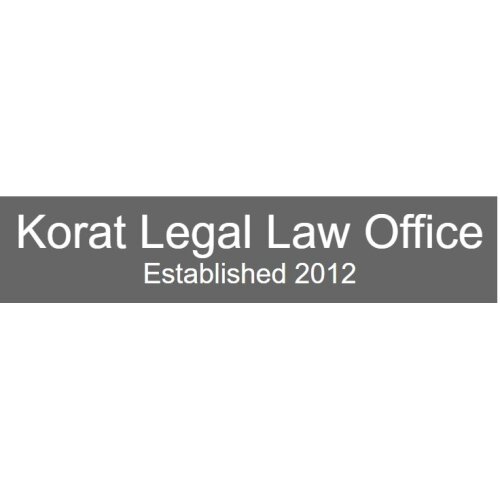Best Restructuring & Insolvency Lawyers in Nakhon Ratchasima
Share your needs with us, get contacted by law firms.
Free. Takes 2 min.
List of the best lawyers in Nakhon Ratchasima, Thailand
About Restructuring & Insolvency Law in Nakhon Ratchasima, Thailand
Restructuring and insolvency law in Nakhon Ratchasima, a major province in northeastern Thailand, mirrors the national legal framework governed by Thai law, with some nuances based on regional commercial practices. These laws are intended to provide procedures and protections for individuals or businesses experiencing financial difficulties. Whether the aim is to help entities restructure and regain solvency, or to facilitate fair asset distribution to creditors through insolvency, Nakhon Ratchasima follows the principles set out in the Bankruptcy Act of Thailand and related regulations. Local courts and legal practitioners are equipped to guide parties through these legal processes, ensuring compliance, transparency and resolution where possible.
Why You May Need a Lawyer
Legal advice in matters of restructuring and insolvency is crucial to protect your rights and interests. Here are some typical scenarios where a lawyer’s expertise can be invaluable:
- If your business faces mounting debts and you are considering restructuring to avoid bankruptcy
- If you or your company are unable to meet financial obligations and fear legal action by creditors
- If you are a creditor seeking repayment from an insolvent debtor
- If you have been served with a bankruptcy petition
- If you wish to negotiate terms with creditors or debtors
- If you want to understand your obligations and options under Thai law
- If you need to prepare or review legal documents relating to insolvency
- If there is a threat of asset seizure or legal proceedings regarding debts
Lawyers ensure that the process is compliant with local laws, minimize potential liabilities for all parties, and strive for an outcome that best preserves the interests of their clients.
Local Laws Overview
In Nakhon Ratchasima, as across Thailand, the Bankruptcy Act is the core legislation covering insolvency and restructuring. Here are some key aspects relevant to local practice:
- Bankruptcy Proceedings: Either a debtor or creditor can initiate bankruptcy proceedings, which must be heard by a local court - typically the Provincial Court in Nakhon Ratchasima.
- Business Reorganization: Companies in significant financial distress can apply for business reorganization instead of liquidation, allowing for continued operation under court supervision while restructuring debts.
- Creditor Protections: Creditors are given rights and channels to recover debts, either through secured or unsecured claims, within established legal priorities.
- Asset Distribution: Upon insolvency, the court oversees asset collection, valuation and fair distribution among creditors.
- Personal Bankruptcy: Individuals, not just companies, may also file for bankruptcy under certain qualifying conditions.
- Fraudulent Transfers: The law provides for the reversal of certain asset transfers made before bankruptcy, to prevent unfair depletion of the debtor’s estate.
Each case is unique and subject to local judicial discretion and the specifics of contracts, asset structures, and the parties involved.
Frequently Asked Questions
What is the difference between restructuring and insolvency?
Restructuring involves reorganizing a company’s debts or operations to restore financial health, typically allowing continued business operation. Insolvency means an individual or business is unable to pay debts as they come due and may involve legal proceedings to liquidate assets and pay creditors.
Can I voluntarily file for bankruptcy in Nakhon Ratchasima?
Yes, both individuals and companies can file for bankruptcy voluntarily at the local Provincial Court when they cannot meet their debt obligations. The process involves submitting an application and supporting documents to the court.
How long does bankruptcy proceedings usually take?
The duration varies depending on case complexity. Straightforward bankruptcy cases might conclude in under a year, while complex restructurings or heavily contested matters can take several years.
Are there alternatives to bankruptcy?
Yes, alternatives include negotiation with creditors, out-of-court settlements, and formal business reorganization proceedings which allow debt restructuring while the company continues trading.
What assets can be protected from creditors?
Thai law provides certain exemptions, but many assets, including property, bank accounts, and vehicles, may be used for debt settlement. Some personal items and income necessary for basic living may be protected, depending on the circumstances.
Will insolvency affect my ability to run a business again?
Bankruptcy can impact your business activities, such as acting as a company director, for a defined period according to Thai law. After discharge from bankruptcy, restrictions may be lifted.
How are creditors paid in insolvency cases?
Creditors are paid according to a hierarchy established by law. Secured creditors typically have priority, followed by preferred creditors, with unsecured creditors paid from remaining assets in proportion to their claims.
Can foreign creditors file claims in Nakhon Ratchasima?
Yes, foreign creditors can participate in Thai insolvency proceedings, but must conform to local rules, including registering their claims in court within specified deadlines.
What happens if a company’s management is found to have committed wrongdoing before bankruptcy?
If the management is found to have acted dishonestly or unlawfully (such as fraudulent transfers or hiding assets), the court may order reversals of such actions and impose penalties, sometimes including personal liability.
Is it necessary to attend court for every stage of the process?
Not always. Many stages, especially procedural steps, can be handled by your lawyer. However, court appearances may be required for hearings, especially if disputes arise.
Additional Resources
For further information or support, the following resources may be helpful:
- Bankruptcy Division of Nakhon Ratchasima Provincial Court - Handles local insolvency cases
- Legal Aid Centers, Nakhon Ratchasima - Offers assistance to those who qualify on income grounds
- Department of Legal Execution (DLE), Ministry of Justice - Provides information on bankruptcy procedure and enforcement
- Thai Bar Association - Lists experienced lawyers specializing in restructuring and insolvency law
- Provincial Office of Commercial Affairs - Offers business advisory and support services during financial distress
Next Steps
If you believe you may need legal assistance in restructuring or insolvency matters in Nakhon Ratchasima, it is wise to act promptly. Begin by organizing all financial documents, contracts, and communications with creditors. Make a list of your assets and liabilities.
Contact a qualified lawyer in Nakhon Ratchasima with experience in this field. An initial consultation can help you understand your rights, obligations and the best pathways to resolution. Whether you are a debtor or creditor, expert advice will position you for the best possible outcome under the law.
Stay informed, review official resources, and do not hesitate to seek support if you find the process complex or stressful. Legal guidance can help you navigate the restructuring or insolvency process with confidence.
Lawzana helps you find the best lawyers and law firms in Nakhon Ratchasima through a curated and pre-screened list of qualified legal professionals. Our platform offers rankings and detailed profiles of attorneys and law firms, allowing you to compare based on practice areas, including Restructuring & Insolvency, experience, and client feedback.
Each profile includes a description of the firm's areas of practice, client reviews, team members and partners, year of establishment, spoken languages, office locations, contact information, social media presence, and any published articles or resources. Most firms on our platform speak English and are experienced in both local and international legal matters.
Get a quote from top-rated law firms in Nakhon Ratchasima, Thailand — quickly, securely, and without unnecessary hassle.
Disclaimer:
The information provided on this page is for general informational purposes only and does not constitute legal advice. While we strive to ensure the accuracy and relevance of the content, legal information may change over time, and interpretations of the law can vary. You should always consult with a qualified legal professional for advice specific to your situation.
We disclaim all liability for actions taken or not taken based on the content of this page. If you believe any information is incorrect or outdated, please contact us, and we will review and update it where appropriate.









